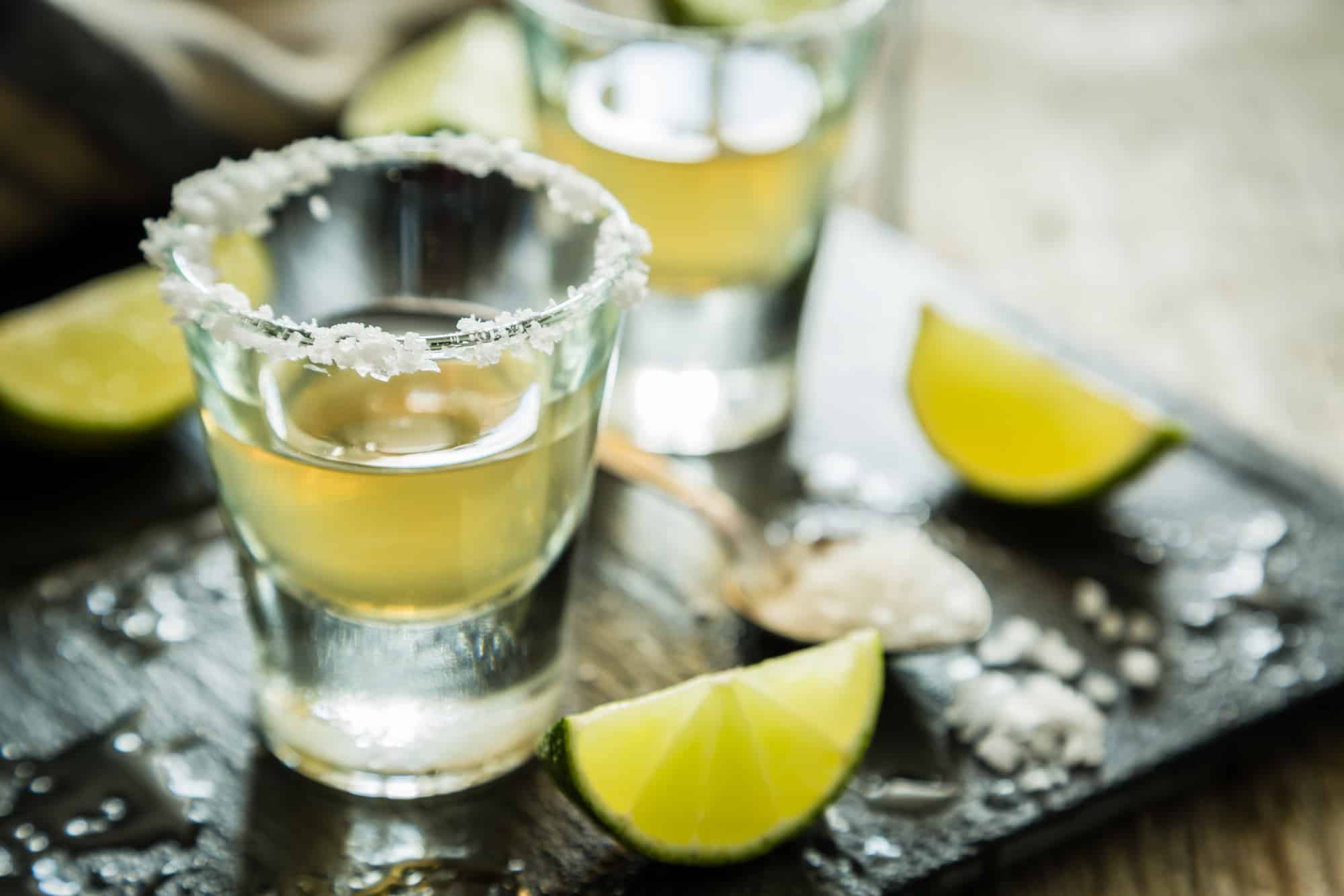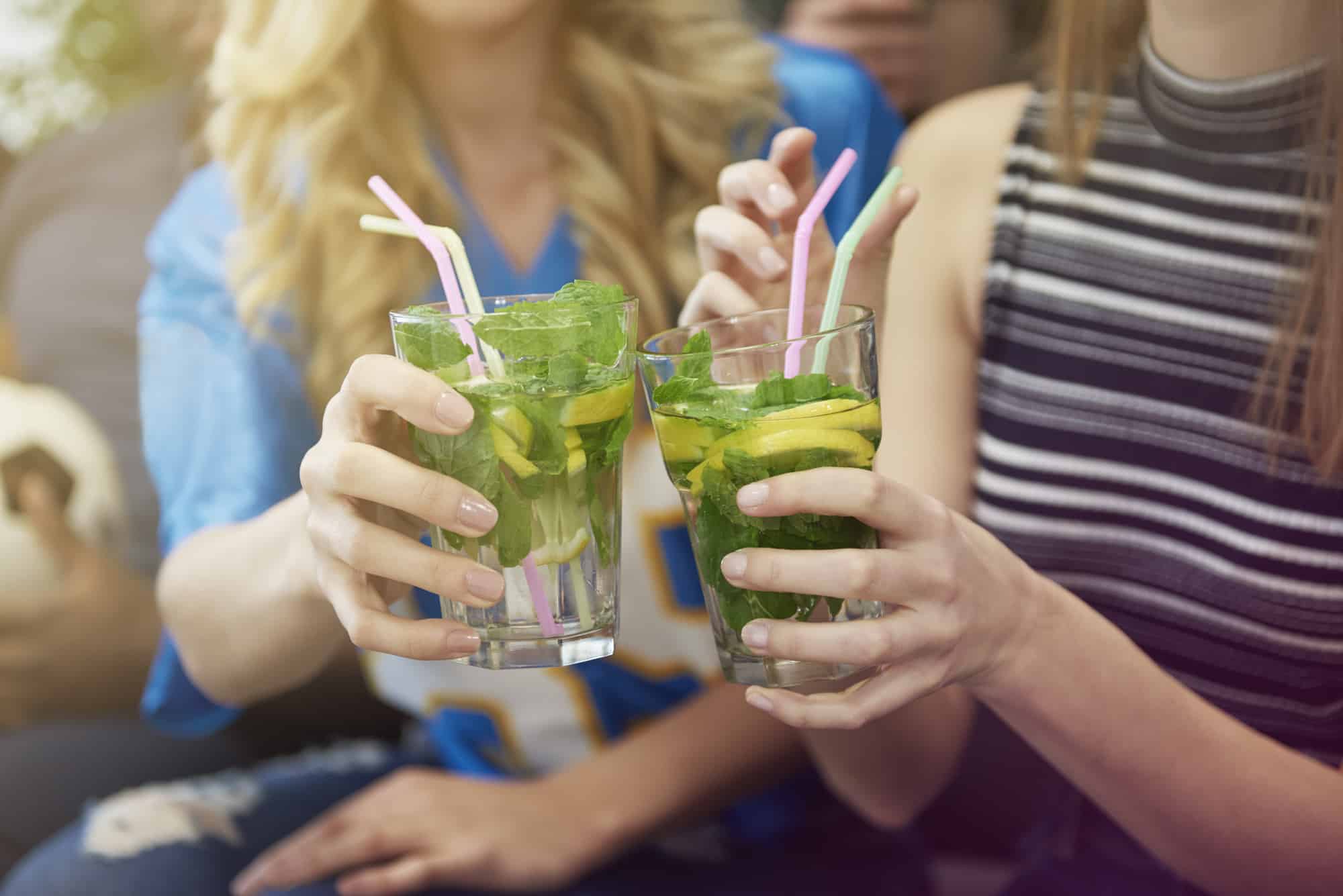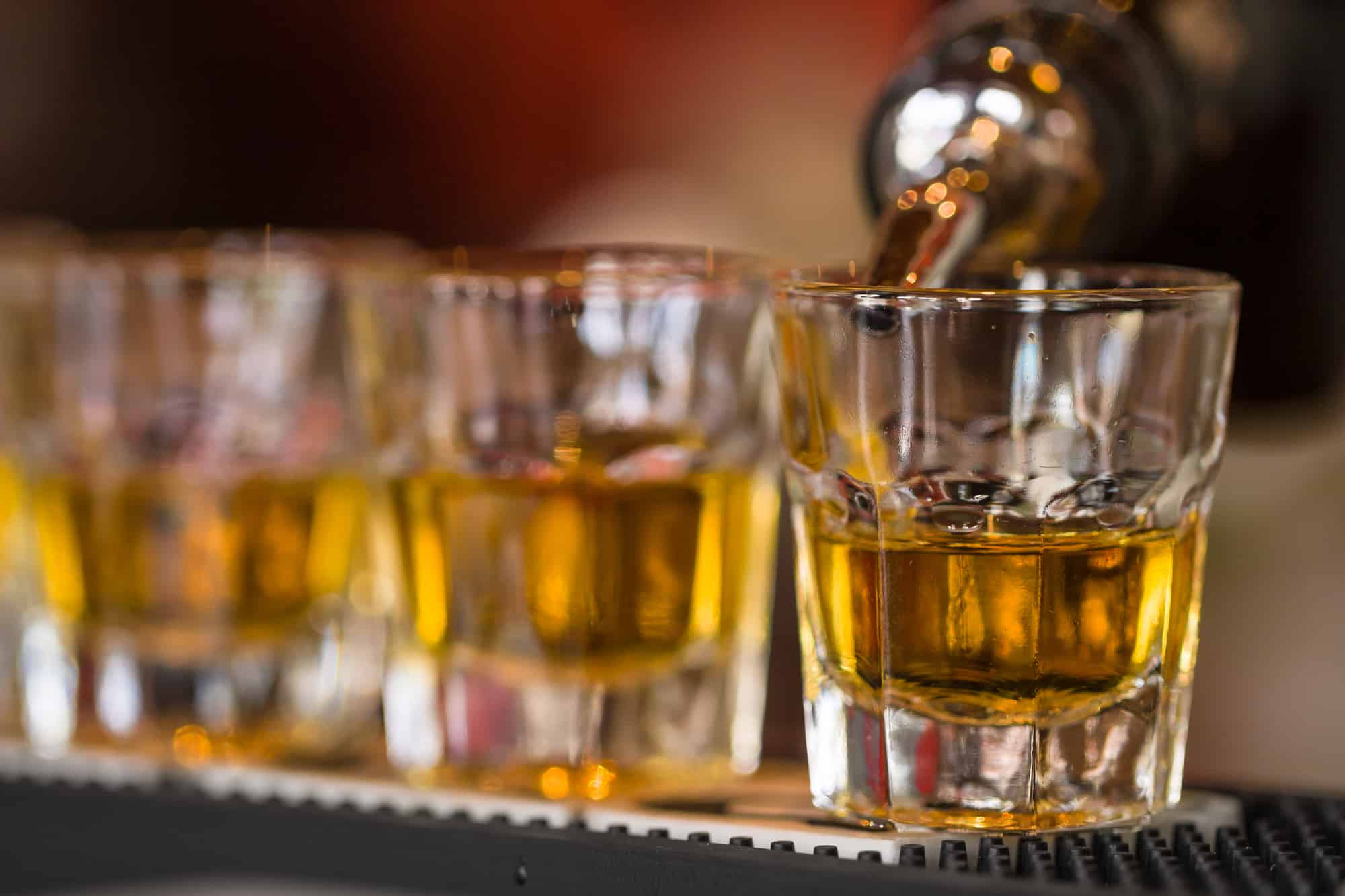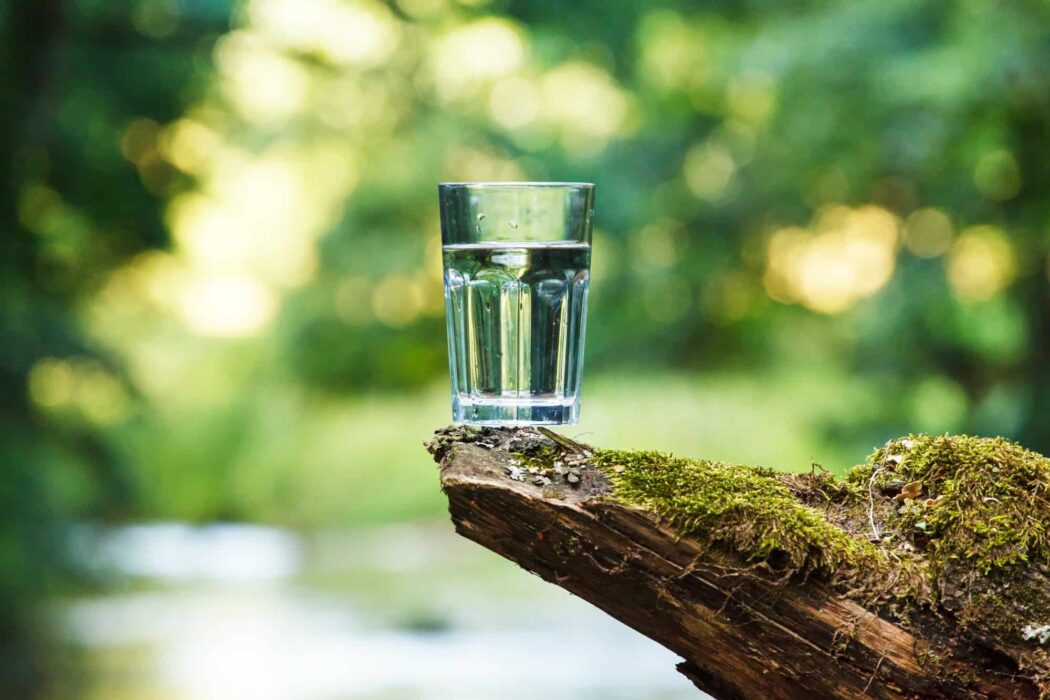Intermittent fasting has become one of the most trendy healthy eating options for weight loss in recent years. There are many different options for this kind of diet, and they all have their benefits. But is this nutritious plan suitable for those who like to have a cocktail with friends on the weekend or a glass of wine at dinner?
The simple answer is yes. You can drink alcohol during intermittent fasting. But, the first thing to consider is in what period you drink alcohol – during meals or fasting. While alcohol is technically not a food, drinking it during a fasting period will break your fast and negate the effects of autophagy, even if it’s a low-calorie drinking option. Besides, drinking on an empty stomach is never a good idea.

But what about drinking alcohol when you are not in a fasting period? Can you drink alcohol during the meal window? What alcohol can you choose during intermittent fasting, and which one should you avoid? How does alcohol affect autophagy? Find out the answers to all these questions in our article! I’ll tell you how alcohol affects intermittent fasting and what types of alcohol are best for it. Let’s dive in!
Can You Drink Alcohol During Intermittent Fasting?
As with most things in life, moderation is key here. If you usually drink in moderation, some alcohol while you eat will not adversely affect the effectiveness of fasting. Moderate alcohol consumption means one drink per day for women and no more than two for men [1].
During the fasting period, your body experiences various cellular and hormonal changes. Many of them have healthy effects on your body, such as reducing inflammation, increasing fat burning, and more.
Intermittent Fasting 14/10: Lazy Weight Loss Plan
But in order to reap the full benefits of intermittent fasting, you must consume zero calories for an extended period of time. And so you need to stop drinking too much, or at least limit it to occasional holidays. If you have to remind yourself to stick to small doses, think about how alcohol might affect your diet results. And it’s not just about calories.
How Does Alcohol Affect Your Body?
When you drink alcohol, your body perceives it as a toxin that needs to be broken down and filtered out of the bloodstream and your body. But, at the same time, everything that you eat is deposited in fat because the body has to sacrifice all metabolic processes to assimilate alcohol.
Some studies also show that alcohol can contribute to weight gain by provoking overeating [2]. In other words, excessive alcohol consumption can interfere with the weight loss process, which is exactly what we most often want to get from intermittent fasting.
Here are the main effects of alcohol on your body:
- Alcohol slows down fat burning in your body because it must first process alcohol and then start digesting food.
- Alcohol provokes extra snacks or overeating processed food.
- Drinking alcohol can damage the intestines and liver, causing various inflammatory reactions. Over time, these inflammatory disorders can cause serious problems such as leaky gut syndrome and fatty liver.
- Introducing alcohol and its calories into your body while fasting is likely to stop autophagy (cleaning and repairing cells) and diminish the health benefits of any diet.
It does not mean that you have to completely cut out alcohol during intermittent fasting. In fact, having a glass of wine at the end of the day can be beneficial. In particular, red wine has a reputation for being potentially heart-healthy [3].

How Does Alcohol Affect Fasting?
Intermittent fasting, as the nutritional plan, allows you to eat at certain periods every day. For example, 8 hours to eat and 16 hours to abstain from food. The rest of the time, you can drink water, tea, or coffee without sugar and milk. Alcohol is not on this list.
It is obvious that drinking beer or wine on an empty stomach is harmful. Besides, it violates the basic principle of fasting because alcohol is full of calories. Drinking too much and waking up with a hangover isn’t a good idea either (especially for better health). But in general, alcohol is not prohibited during intermittent fasting. Only it needs to be added into the window when you can eat, for example, have a drink at dinner. But don’t get carried away! Or another option: eat when the window is “opened” and drink an hour later so that there is no effect of an empty stomach.
Try not to drink less than three hours before bedtime. Otherwise, it will be difficult for the body to enter the deep sleep phase. As a result, you will not get proper rest. And if the digestive tract has time to digest alcohol before bedtime, everything will be fine.
How Does Alcohol Affect Weight Loss?
The body perceives alcohol as a toxic liquid and seeks to quickly deal with it. And what you eat at this time is most often stored in the form of a fat resource: the digestion of food has a lower priority than alcohol.
How to Tone Your Stomach: 6 Best Exercises
As for calories, there are 150-200 in a bottle of beer, 125 in a glass of white wine, and from 150 to 300 in cocktails, depending on the composition. The least amount of calories is a combination of strong alcohol and sugar-free drinks.
However, there is another problem. When you drink, you don’t follow your diet so strictly, and you can go over calories, constantly eating endless snacks. And this eventually affects the process of weight loss.

Tips for Drinking Alcohol during Intermittent Fasting
So, we have figured out that you can allow yourself some alcohol during meals and before bed. What do you need to know to prevent alcohol from harming your fasting?
Moderate Alcohol Intake May Be Beneficial
Research shows that drinking alcohol in moderation (1 drink a day for women, 1-2 drinks a day for men) can benefit your health in the long term. Several large studies have shown that people who drink in moderation have better blood sugar control [4] and a lower risk of heart disease, stroke, dementia, and diabetes. [5] So a glass of wine with dinner can make you healthier. It just doesn’t need to be overused.
Don’t Drink Alcohol on Empty Stomach
Suppose you’re going to drink during intermittent fasting. In that case, it’s best to eat something first or consume alcohol along with a hearty meal. Alcohol is digested much faster if you drink it on an empty stomach. As a result, more alcohol enters the bloodstream, and you will quickly get drunk. In addition, your body can become intoxicated, and the result will be unhealthy soon after drinking.
If You’re Going to Drink, Choose the Right Alcohol
Avoid high-carb cocktails and pre-made beverages as they are too high in calories and carbs. Choose a small amount of dry wine or low-carb alcoholic drinks – whiskey, gin, vodka, tequila, etc.

What to Drink during Fasting?
So, we have figured out what and in what quantity you can drink during an intermittent fasting meal intake. What can you drink during your fasting period to not disrupt the fasting process?
There are one strict rule and one recommendation here:
- No calories. The principle of intermittent fasting is not to get any calories in the intervals between meals. Therefore, all high-calorie drinks such as milk, alcohol, juices, and soda are excluded immediately.
- Minimal impact on metabolism and stomach health. Intermittent fasting is aimed at altering metabolism. Drinks such as tea[6] or coffee [7], in large doses, can affect metabolism, hence the effect of intermittent fasting. Therefore, it is better to limit their consumption. Moreover, tea on an empty stomach can cause nausea and coffee hungry cramps and increase the acidity of the stomach [8]. Not the best background for abstaining from food, is it? If you cannot go without tea or coffee, brew them as weakly as possible or choose herbal teas.
The safest drink for maintaining a fluid balance between meals is pure water. But if in the first days there is a feeling that you are missing something, you can support yourself with a teaspoon of lemon juice, quality apple cider vinegar, or unsweetened herbal tea.

Conclusion
So can you drink alcohol during intermittent fasting? In short: yes, but you need to keep track of what time you drink, what exactly, and how much. It is not necessary to give up alcohol completely, but indulging in excess is also not a good idea.
Everything You Need to Know About Skinny Tea for Weight Loss
You can have a couple of glasses of wine with dinner and be sure to do it only after your meal. When fasting, choose clear water, mild tea, coffee, or herbal teas. Monitor your feelings, and you will find your healthiest option.
Sources:
- U.S. Department of Health and Human Services and U.S. Department of Agriculture. 2015–2020 Dietary Guidelines for Americans. 8th Edition. December 2015. Available at https://health.gov/our-work/food-nutrition/previous-dietary-guidelines/2015.
- Cains S, Blomeley C, Kollo M, Rácz R, Burdakov D. Agrp neuron activity is required for alcohol-induced overeating [published correction appears in Nat Commun. 2017 May 19;8:15668]. Nat Commun. 2017;8:14014. Published 2017 Jan 10. (doi:10.1038/ncomms14014)
- Liberale L, Bonaventura A, Montecucco F, Dallegri F, Carbone F. Impact of Red Wine Consumption on Cardiovascular Health. Curr Med Chem. 2019;26(19):3542-3566. (doi:10.2174/0929867324666170518100606. PMID: 28521683)
- Standridge JB, Zylstra RG, Adams SM. Alcohol consumption: an overview of benefits and risks. South Med J. 2004 Jul;97(7):664-72. (doi:10.1097/00007611-200407000-00012. PMID: 15301124.)
- Baum-Baicker C. The health benefits of moderate alcohol consumption: a review of the literature. Drug Alcohol Depend. 1985 Jun;15(3):207-27. (doi:10.1016/0376-8716(85)90001-8. PMID: 4028954.)
- Takahashi M, Ozaki M, Tsubosaka M, et al. Effects of Timing of Acute and Consecutive Catechin Ingestion on Postprandial Glucose Metabolism in Mice and Humans. Nutrients. 2020;12(2):565. Published 2020 Feb 21. (doi:10.3390/nu12020565)
- Acheson KJ, Zahorska-Markiewicz B, Pittet P, Anantharaman K, Jéquier E. Caffeine and coffee: their influence on metabolic rate and substrate utilization in normal weight and obese individuals. Am J Clin Nutr. 1980 May;33(5):989-97. (doi:10.1093/ajcn/33.5.989. PMID: 7369170)
- Liszt KI, Ley JP, Lieder B, Behrens M, Stöger V, Reiner A, Hochkogler CM, Köck E, Marchiori A, Hans J, Widder S, Krammer G, Sanger GJ, Somoza MM, Meyerhof W, Somoza V. Caffeine induces gastric acid secretion via bitter taste signaling in gastric parietal cells. Proc Natl Acad Sci U S A. 2017 Jul 25;114(30):E6260-E6269. (doi:10.1073/pnas.1703728114) Epub 2017 Jul 10. PMID: 28696284; PMCID: PMC5544304.